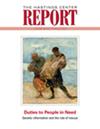绘制黑人男性大脑健康的新领域:对痴呆症研究和公众参与的影响。
IF 2.3
3区 哲学
Q1 ETHICS
引用次数: 0
摘要
这篇文章批判性地探讨了黑人男性生活经历背景下大脑健康和痴呆症研究的交集。它质疑了大脑健康的主流叙事,这些叙事优先考虑个人责任,而忽视了健康的系统性和结构性决定因素。从生命历程的角度来看,这篇文章提倡包容性的研究实践,以黑人男性的声音为中心,挑战基于赤字的假设,并解决大脑健康的系统性障碍。最后,它概述了促进大脑健康公平的变革性研究、倡导和护理的路线图。本文章由计算机程序翻译,如有差异,请以英文原文为准。
Charting New Frontiers for Black Men's Brain Health: Implications for Dementia Research and Public Engagement
This essay critically explores the intersection of brain health and dementia research within the context of Black men's lived experiences. It interrogates dominant narratives of brain health that prioritize individual responsibility while neglecting systemic and structural determinants of health. Drawing on a life-course perspective, the essay advocates for inclusive research practices that center Black men's voices, challenge deficit-based assumptions, and address systemic barriers to brain health. Finally, it outlines a roadmap for transformative research, advocacy, and care that advances brain health equity.
求助全文
通过发布文献求助,成功后即可免费获取论文全文。
去求助
来源期刊

Hastings Center Report
医学-卫生保健
CiteScore
3.50
自引率
3.00%
发文量
99
审稿时长
6-12 weeks
期刊介绍:
The Hastings Center Report explores ethical, legal, and social issues in medicine, health care, public health, and the life sciences. Six issues per year offer articles, essays, case studies of bioethical problems, columns on law and policy, caregivers’ stories, peer-reviewed scholarly articles, and book reviews. Authors come from an assortment of professions and academic disciplines and express a range of perspectives and political opinions. The Report’s readership includes physicians, nurses, scholars, administrators, social workers, health lawyers, and others.
 求助内容:
求助内容: 应助结果提醒方式:
应助结果提醒方式:


